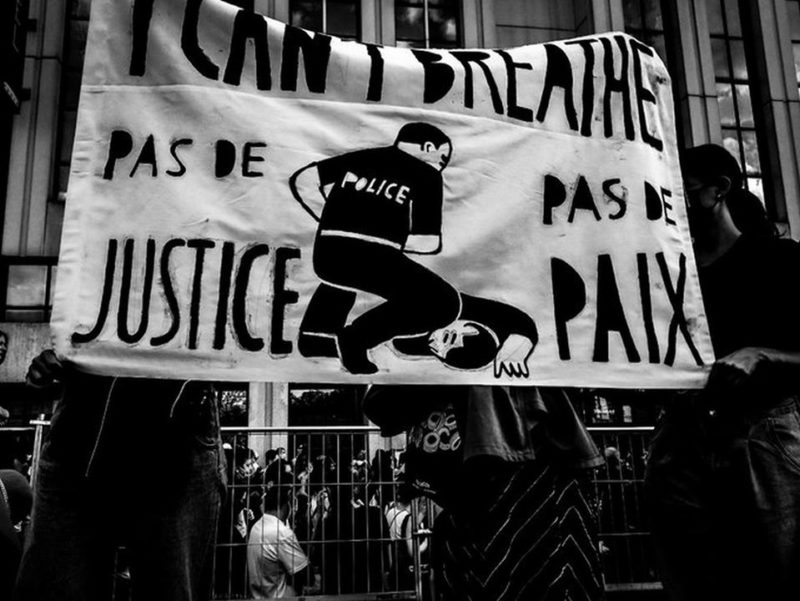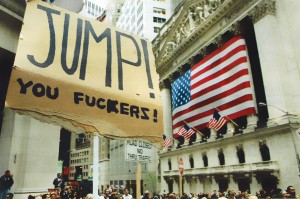Notes on the police and the banlieues
[Publié initialement par Carbure, le 17 février 2017. Traduit en anglais par feu ediciones inéditos devenues depuis prolewave.noblogs.org].
 One could say of the police what has been said about the army, that is a much too serious thing to be confided to the police; but we must not forget that capitalism has also allowed the military to wage war as they wished for as long as it has been necessary for capitalism to go to war.
One could say of the police what has been said about the army, that is a much too serious thing to be confided to the police; but we must not forget that capitalism has also allowed the military to wage war as they wished for as long as it has been necessary for capitalism to go to war.
Like any institution, the police enjoy a certain amount of relative autonomy in relation to its internal and external authorities: the State has its own hierarchy. This autonomy exists at all its levels: in the streets, at the police station and at the regional level the police defend their own interests as a corporation and as an institution. As a corporation, it depends on the material and legal means which the State accords it and as an institution, it depends on ideological justification from the State, by what is known as its security doctrine.
This doctrine bases itself on a general appreciation for the situation of the State, from its point of view. This is a theoretical and strategic form, based on the presuppositions of the State, taking into consideration its own legitimacy, and on the other hand its specificity in bringing into form, according to its operative categories, class relations under the dominant class. At its level the police, with its legitimized violence, is entrusted with the maintenance of these class relation in a form determined by the State.
When police officers, as a corporation, refuse to obey the State on such and such point (as in the case of having to carry their badge number), they do not call into question the State or its security doctrines just as the CGT Energy union workers do not call into question nuclear power. But the autonomy of the police which demonstrates their exasperation [with the State] has a particular connotation, since what would remain of the State if the police no longer obeyed it? And which State would follow a State whose police (without completely abandoning its function) would be absent? We could say that every State is a Police State, so much so that it could not exist without the police, and conversely that some States are more of a Police State than others, which bears its own implications.
The police’s interest, as a corporation, is the existence of a Police State. The police are to a Police State as what railway workers are to rail transport. The police prefer the Front National [Far-Right French party], just as workers preferred the Communist Party 30 years ago. But the State does not properly become a Police State until certain circumstances demand it, which is to say the police have become the best way to govern, and this is when its time to begin to worry.
In France, the ethnicization of the working-class coupled with the geographical placement of racialized workers has led to a situation where the differential in treatment between someone from a not very posh city center and someone in the banlieues [generally impoverished suburbs of France] has become glaring. Do we see in the city centers police patrols putting people against the walls, checking for ID three to four times a day, slapping them and insulting them on the daily? Such actions would be judged scandalous, but this is the daily reality of the residents of the banlieues, in particular the youth.
French class relations were built on the assignment of semi-skilled labor from former colonies, so as to permit, in an ever more complex division of labor, the maintenance of skilled labor for a large part of the working-class, but without depressing wages. This division of labor become structural, or rather “naturalized.” The French middle-class was itself constructed on this ethnic division of labor, which has arranged (almost) everyone: these were the Trente glorieuses [period of economic boom, 1945 – 1973].
With the [capitalist] restructuring of the ’70s & ’80s, the dismantling of grand workers’ centers and the development of “new cities,” these racial assignations of the most exploited parts of the proletariat was redoubled with a geographical assignation, while mass unemployment became structural. The white working-class and “white collar workers” have then progressively abandoned the cities to racialized workers and their families, so much so that work as we knew it has completely disappeared.
If the banlieues of France are today the site where the surplus population of restructuralized Capital are most heavily situated, we must then understand what the term “surplus population” means. This surplus population is not “in excess,” since they do work. That said they work in sectors where precarity is endemic, where flexability is the rule, where the [work] contracts are short-term or just don’t exist at all. This is the end result: banlieues where the population is three time more likely to be unemployed than elsewhere; isolated from the city centers coveted by the upper middle-class; geographically isolated but connected to the city centers where work is to be found. Along with unemployment comes juvenile delinquency and drug trafficking, which the police use to justify their actions, but let’s not joke here: the banlieues of France are not the Medellín Cartel, because if this was so, police officers would not so easily be able to walk about in groups of four handing out blows to the kids. The reality of the banlieues, as elsewhere, is work, and in this case, the kind of work which nobody wants.
There is where the police play their role of maintaining this set of affairs by force, by reminding those who suffer under it that it could always be much worse. The daily injustice felt there holds a functional role: those who are willing to calmly undergo a police checkpoint so that they do not lose their job will be also willing to do an extra unpaid hour of overtime to keep it. In this sense, the cities are not abandoned areas, but rather particular areas submitted to a particular treatment.
This particular treatment present the characteristics of a localized Police State: permanent suspicion cast on all persons, brutality as a mode of governance, the negation of all rights which serve to protect citizens from their State, putting people in line which is also an act of putting people to work. This situation exists in a distributed manner in the world, it exists in France in certain areas.
Everyday, in the banlieues, the police exist as a group of armed men which enforce the racial order as the reigning social order. The racism in their heads serves immediately adequate to their function. Racist insults and violence are not anomalies, but the rule, as all those who have had run-ins with the police know.
There is no division between the individual racism of police officers and structural character of racism: rather it is the general racist structure of this society which creates racist police officers.
The police do not just act as racist and violent individuals, but as a corporation, which as such consistently carries out this structural racism and defends it. No police union member will denounce the policy of racial and geographical segregation which is daily applied by the police. On the contrary, this person will seek out even more means to carry out this task. When the police shoot live rounds during a demonstration on the eve of the voting in of a law, which would broaden the rules of legitimate police self-defense,this says that the police – as a “constituted body” – know full well what they do and what it would like to accomplish.
The police are not, as such, responsible for the particular treatment reserved to a category of individuals based on the color of their skin, but their job is to perpetuate this situation, because is entrusted with maintaining order, and it is this kind of order which it must maintain. This is the police’s function, a function shared with the whole of society’s institutions, from the courts to the school system, to make the racial distinction structural. The particularity of the police is fulfill this function by force. It only desires juridical and material means for as long as their functions meets its own and the State will provide these not because it trembles before the police, but because it is in accordance with its policy. The State’s role is to condemn the police “slip-ups” [bavures], to promise sanctions which never come down (that which is called, “letting justice do its work) and to eventually to show up, as the President, at the bed side of its victims.
The police are a perfectly unproductive body. Thus it should not be shocking that the police have not invented their own kind of racism, sexism nor their own social contempt which it demonstrates to all those whom: do not resemble a suit and tie; to all those whom are the product of a society which establishes difference by way of gender, race and class as the basis for wealth for some, and which separates individuals by assigning to each their place in the generalized division of labor.
But then a uniformed, young, 27 year old man plunges a truncheon into the anus of a 22 year old black man, and this perfectly summarizes an untenable situation.
Faced with this, the riots exploding, with every “drop of water” which overflows from an ever-filling vase, are very much necessary in every sense of the word. Less obvious is the necessity of the constitution of a political visibility of the banlieues: this term which fails to express the radical oppression and specific organization of capitalist exploitation found there.
The critique of the police, which is the shared reality of so many varied situations, could be the starting point for more concerted struggles, smashing silence and invisibility, and forcing responses from more than just the police. If restoring the level of police violence in the banlieues to that found in the rest of the country seems utopian, it could then be possible to make visible the gap between the two, which would already be a lot, since for some to ask for a shared-level of justice already seems to be too much to ask for.
It remains to be seen if this gap, once made visible, would not end up rather reassuring than scandalizing those who are on the right side of the law and tend to stay there. But that’s another story and the object of other sad stories.
Feb. 17th, 2017
AC

Une revue US défunte mal connue en France, qu’on gagnerait à découvrir : https://libcom.org/library/race-traitor-1